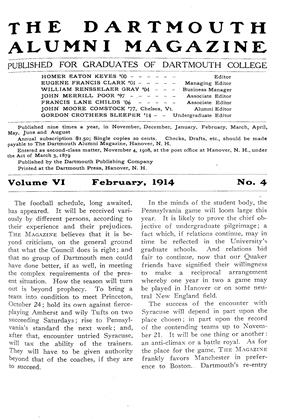EDITOR DARTMOUTH ALUMNI MAGAZINE:
SIR:
Since the publication in your last issue of my communication entitled "The Olcott-Leeds House", a few additional facts relating to that building have been made known to me through the courtesy of the accomplished historian of the College, Professor John King Lord.
These facts, which may be of interest to your readers, are the following: the Olcott-Leeds house, which has been the College parsonage since 1842, was built in 1786 by Professor Sylvanus Ripley, on an acre of land given him by the College. It was not finished at the time of his death, February 5, 1787, although his family was occupying it. After his death the family continued in it till March, 1794, when Mrs. Ripley con- veyed the property to George Foot, who set up a tavern in it. He lived there till 1801 or 1802, and mortgaged the property to Richard Lang, a local merchant, of whom Mills Olcott bought it in 1801. The house was afterwards occupied by Mills Olcott, William H. Duncan, Esq., who married a daughter of Olcott, Professor Clement Long, Dr. John Richards, who was settled as the college pastor in 1842, and Dr. Leeds.
Distinguished men, who, according to my personal knowledge, have been sheltered under this hospitable roof are the following: Dr. John Lord, the historical lecturer; James T. Fields, author and publisher; George MacDonald, novelist; and the poet, Walt Whitman. It was a second home" to the late Professor John Henry Wright of Harvard University, and to the great missionary family of Gulicks. This list of notable guests could, I am sure, be greatly enlarged from the memory of living alumni and I hope you will invite their cooperation.
Sincerely yours,
90 Mt. Vernon Street, Boston, Mass. January 9, 1914
To EDITOR OF THE DARTMOUTH ALUMNI MAGAZINE:
The association of distinguished persons with the Olcott-Leeds House, as Prof. C. F. Bradley suggests in his admirable plea for its preservation, published in your last issue, makes it one of the most interesting among the historic dwelling houses in New England.
It may not be known to all your readers that Webster's first entrance into this house in 1797 does not rest upon vague tradition, but is well attested. At a meeting of the Faculty, undergraduates,. and citizens held in the College chapel, October 25, 1852, the day after the news of his death reached Hanover, its chairman, the venerable Professor Shurtlefif, speaking of his personal acquaintance with Mr. .Webster during their college days, said:
"When I came to enter this institution in 1797, I put up with others from the same academy at what is now called the Olcott House (now Dr. Leed's, then Ford's Tavern), which was then a tavern. We were conducted to a chamber, where we might brush our clothes and make ready for examination. A young man, a stranger to us all, was soon ushered into the room. Similarity of object rendered the ordinary forms of introduction needless. We learned that his name was Webster, also where he had studied, and how much Latin and Greek he had had, which I think was just to the limit prescribed by law at that period, and which was very much below the present requisition."
Any list of the orators, scholars, and poets who have addressed the College and its various literary societies, and their visitors to the place since 1830, would discover the names of many eminent persons who have shared the hospitality of this historic house. A story which my father, who was a graduate of the class of 1838, told me when a lad seems to identify Longfellow as one such guest. The poet came to Commencement in 1837 with his friend, George S. Hilliard, the orator of the occasion. The story represented Longfellow, albeit he speaks in his journal of spending the afternoon on the balcony of the hotel, after listening to twenty-five out of thirty-five commencement parts, as sitting in the parlor of the Olcott house when the Dean of the Medical School, Dr. Ruben D. Muzzey, called to invite him to dine at his home (now the brick part of Crosby Hall). Before receiving the poet's acceptance, Dr. Muzzey, who was widely known as an ardent vegetarian, added, as it was reported, "I hope you will assume that it is not our practice when entertaining guests to offer them such a limited bill of fare as we might prescribe for our patients, nor to discourse upon 'Health, its Friends and its Foes' "—which was the title of one of his later books.
January 23, 1914
EDITOR DARTMOUTH ALUMNI MAGAZINE:
Hanover. N. H. MY DEAR SIR:
Let me express my appreciation of Professor Adams' analysis of alumni responsibility in his speech before the Alumni Council. The stand there taken for the intellectual and moral life of the College completes in a very satisfactory manner the trinity of college training at its highest efficiency.
I feel that there must be a large number of the alumni whose convictions were expressed in Professor Adams' speech, and who are proud to see a representative of the College emphasizing these so ably.
Yours truly.
 View Full Issue
View Full Issue
More From This Issue
-
 Article
ArticleTHE STATUS OF COLLEGE FRATERNITIES
February 1914 By Homer Eaton Keyes -
 Class Notes
Class NotesFRANK S. BLACK
February 1914 By WILBUR H. POWERS '75 -
 Class Notes
Class NotesLOCAL ASSOCIATIONS
February 1914 -
 Article
ArticleThe football schedule, long awaited,
February 1914 -
 Class Notes
Class NotesCLASS SECRETARIES
February 1914 -
 Article
ArticleNEW QUARTERS FOR THE BANK
February 1914








